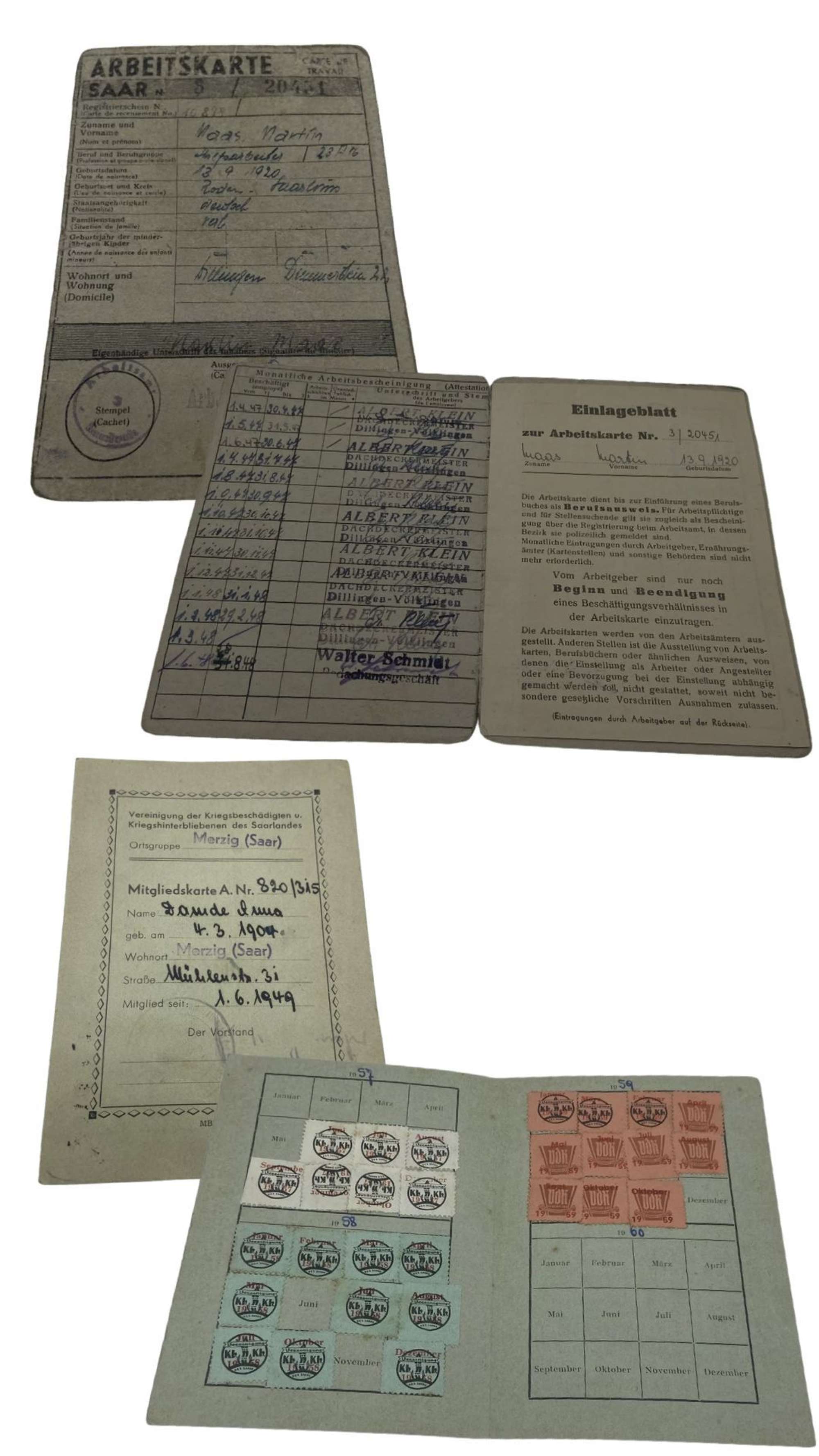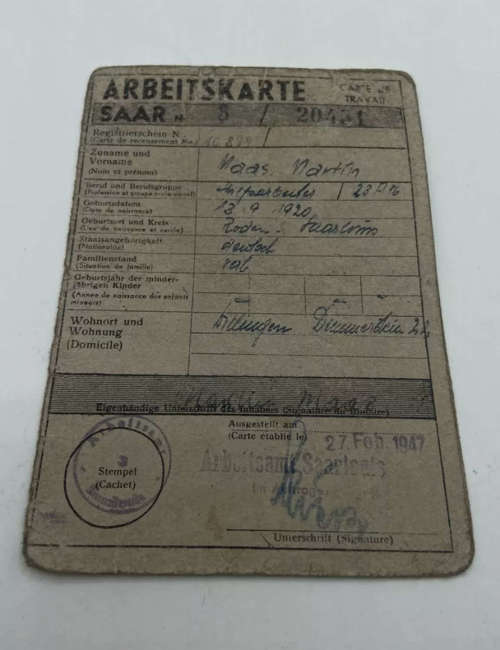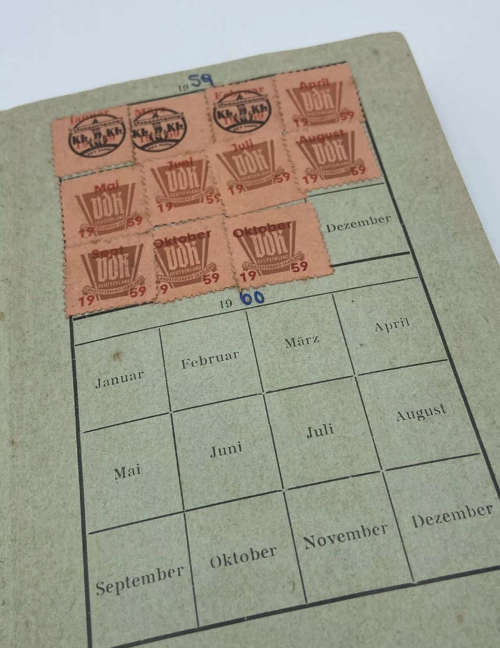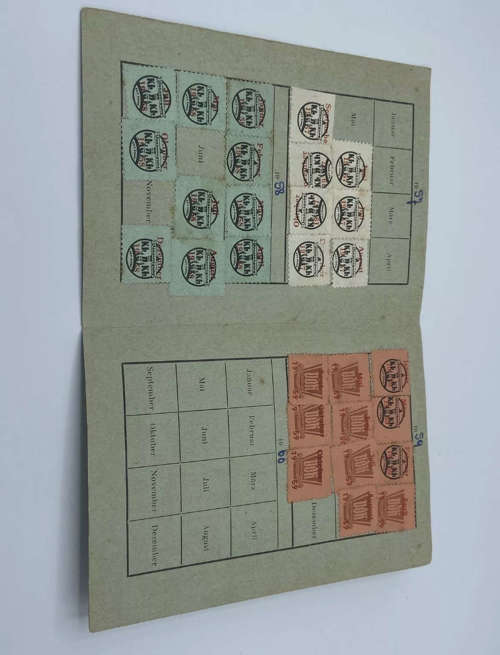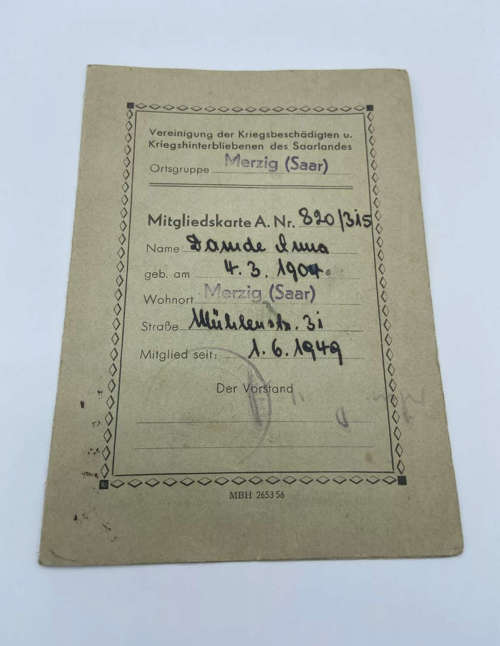Post WW2 1940s German Saar Work Card, Travel Slip & War Victims
Delivery Quote Request
Please fill in the form below to request a delivery quote from Atlas Antiques.
Contact Atlas Antiques
 Dorset, United Kingdom
Dorset, United Kingdom
Simply fill in the below form to get in touch with Atlas Antiques regarding this item.
About this item
For sale is a rare pair of Post WW2 1940s German Saar Work Card, Travel Slip & War Victims & Survivors Card.
Post WW2 1947 Dated German Saar Work Card with Multiple Entries. In good condition for its age.
In July 1945, two months after World War II had ended in Europe, the Allied forces were redeploying from the areas they had conquered into their respective zones of occupation. On 10 July 1945, US forces left the Saar and French troops established their occupational administration. On 16 February 1946, France disentangled the Saar from the Allied zones of occupation and established the separate Saar Protectorate, which was no longer under the joint Allied jurisdiction by the Allied Control Council for Germany.
French officials deported a total of 1,820 people from the Saar in 1946 and 1947, most of whom ultimately were allowed to return. However, France had not agreed to the expulsions approved (without input from France) in the Potsdam agreement by the Allies, so France refused to accept war refugees or expellees from the eastern annexed territories in the Saar protectorate or the French zone. However, native Sarrois returning from Nasi-imposed-removals (e.g. political and Jewishrefugees) and war-related relocations (e.g. evacuation from air raids) were allowed to return to the areas under French control. France aimed at winning over the Saar population for a future annexation.
With effect from 20 July 1946, 109 municipalities of the Prussian Rhine Province within the French zone were added to the Saar Protectorate. By 18 December 1946 customs controls were established between the Saar and allied occupied Germany. By further territorial redeployments between the Saar Protectorate, constituted in early 1947, and neighbouring Rhineland-Palatinate (a new state established on 30 August 1946 in the French zone), 61 municipalities returned to Germany, while 13 other municipalities were ceded to the Saar Protectorate between 8 June 1947 and 1949, followed by one further Palatine municipality incorporated into the Saar in the latter year.
On 16 July 1947 the Saar mark replaced the Reichsmark as legal tender in the Saar Protectorate, followed by the integration of the Saar into the French currency area on November 15 the same year. While only French franc banknotes circulated from 1954 on, Saar franc coins, designed similar to French coins, were issued too. On 15 December 1947 the Saar was constituted by its constitution as the Saarland, with an elected government under the control of the French high commissioner Gilbert Grandval. December 1947 had severe flooding along the Saar river, water higher than in the past 150 years, with extensive relief efforts undertaken. On 23 March 1948 the customs union with France was confirmed, taking effect on 1 April.
Initially, a policy of industrial disarmament was pursued in Germany by the Allied powers (see industrial plans for Germany). As part of this policy limits were placed on permitted production levels, and industries in the Saar were dismantled as they had been in the Ruhr, although mostly in the period before the detachment (see also The 1949 letter from the UK Foreign minister Ernest Bevin to the French Foreign minister Robert Schuman, urging a reconsideration of dismantling policy). This policy was quickly reversed in mid-1946 or early 1947.
France's attempts to internationalize the Ruhr (see International Authority for the Ruhr) were abandoned in 1950 when, in the face of cold war pressures in Europe, the French government took an historic step in deciding that the only viable political model for the future lay in European integration. This resulted in the Schuman Declaration, a plan drafted for the most part by Jean Monnet. The plan put forward a rapprochement between France, Germany, and other European countries wanting to participate. As a first step, France and Germany were to agree to pool their markets for coal and steel, following the establishment of the European Coal and Steel Community (ECSC).[6] With the participation of West Germany in the ECSC, agreement on termination of the International Authority for the Ruhr came into force on 25 June 1952. However, France delayed the return of the Saar.
Under French rule, pro-German parties were initially banned from contesting the elections. Much support was given to the Mouvement pour le Rattachement de la Sarre à la France, a Francophile movement founded by Saar exiles in Paris in early 1945, with many of the exiles having returned after the war. However, in the general election of December 1952, 24% of the voters cast blank ballots in support of banned pro-German parties (while the majority still voted for one of the legal parties who wanted the Saar to remain autonomous).
In the speech Restatement of Policy on Germany, given in Stuttgart on 6 September 1946, the US Secretary of State James F. Byrnes stated the US's motive in detaching the Saar from Germany as "The United States does not feel that it can deny to France, which has been invaded three times by Germany in 70 years, its claim to the Saar territory".
Please see photos for more details. Guaranteed original or money back guarantee. This will be sent first class signed for and dispatched within two to three working day’s.
Disclaimer: Items related to the Nazi regime or the Third Reich sold by dealers on this platform are intended solely for educational, historical, or TV/film prop purposes. Militaria Zone does not promote, and is strongly against, the hate ideologies and atrocities committed during WWII.
The law regarding sales of items like this vary depending which country you are in. If in doubt, please check the law in your country.
Additional Information
![]() Dorset, United Kingdom
Dorset, United Kingdom
Atlas Antiques Promises You - Fresh stock weekly - Fair & affordable prices - Everything listed is original, money back guaranteed. (Unless marked fantasy or reproduction). - Fast responses and delivery's made within 2-3 working days. Atlas Antiques only handles items in terms of...

